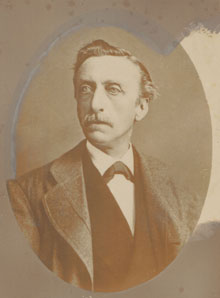Multatuli Collection > Biography
Multatuli is the pen name of Eduard Douwes Dekker, who was born on March the 2nd, 1820, in Amsterdam at 20 Korsjespoortsteeg. In 1838 he sails to the then Dutch East Indies on the trading vessel his father captains. His career moves swiftly and in 1856 he rises to the post of assistant-resident of the Lebak district (Bantam, Java). Before long he lodges a complaint against the regent, Karta Natta Negara, whom he suspects of criminal offences. His superiors wave his accusations aside and Douwes Dekker hands in his resignation. He leaves for Europe, and in the small Brussels hotel Au Prince Belge he writes his most famous book, Max Havelaar. The book appears in 1860 and, all at once, Douwes Dekker becomes a celebrity under the pseudonym of Multatuli (Latin for ‘I suffered a lot’), which he adopted at the time Max Havelaar was published. The book deals with the abuses prevailing under Dutch rule in the Dutch East Indies.
The book is such a success that Multatuli finds himself turning, almost unwillingly, to writing. He would have preferred to exploit his celebrity status as a politician, but as a writer he gets the attention that he didn’t receive in politics.
In many letters, pamphlets, essays and tales, he harasses the country with his social criticism and holds a mirror up to the Dutch people. After Max Havelaar, his major work are the Ideën, a collection of in total almost 1,300 shorter and longer texts on all kinds of subjects of public debate at the time. The Ideën were published in instalments and included the semi-biographical story of Woutertje Pieterse, a romantic young boy living in Amsterdam at the end of the 18th century.
After having written for seventeen years, Multatuli suddenly lays down his pen in 1877. He moves to Germany for good and dies in the town of Ingelheim am Rhein on 19th February 1887. Four days later, he becomes the first Dutchman in history to be cremated.

